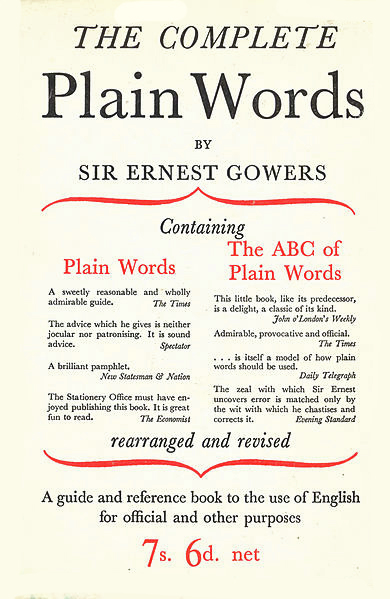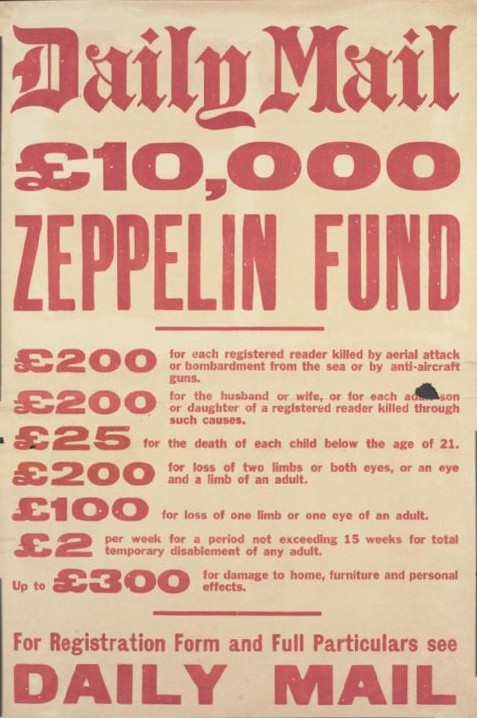|
The Complete Plain Words
''The Complete Plain Words'', titled simply ''Plain Words'' in its 2014 revision, is a style guide written by Sir Ernest Gowers, published in 1954. It has never been out of print. It comprises expanded and revised versions of two pamphlets that he wrote at the request of HM Treasury, ''Plain Words'' (1948) and ''ABC of Plain Words'' (1951). The aim of the book is to help officials in their use of English as a tool of their trade. To keep the work relevant for readers in subsequent decades it has been revised by Sir Bruce Fraser in 1973, by Sidney Greenbaum and Janet Whitcut in 1986, and by the original author's great-granddaughter Rebecca Gowers in 2014. All the editions until that of 2014 were published by Her Majesty's Stationery Office (HMSO). The most recent is issued by an imprint of Penguin Books. Background The association of wordiness with bureaucracy has a long history. In the 14th century Geoffrey Chaucer, a prominent civil servant as well as a poet, urged the use ... [...More Info...] [...Related Items...] OR: [Wikipedia] [Google] [Baidu] |
Eric Partridge
Eric Honeywood Partridge (6 February 1894 – 1 June 1979) was a New Zealand–British lexicographer of the English language, particularly of its slang. His writing career was interrupted only by his service in the Army Education Corps and the RAF correspondence department during World War II. Early life Partridge was born in the Waimata Valley, near Gisborne, on the North Island of New Zealand to John Thomas Partridge, a grazier, and his wife Ethel Annabella Norris. In 1908 the family moved to Queensland, Australia, where he was educated at the Toowoomba Grammar School. He studied classics and then French and English at the University of Queensland. During this time Partridge also worked for three years as a schoolteacher before enrolling in the Australian Imperial Force in April 1915 and serving in the Australian infantry during the First World War, in Egypt, Gallipoli and on the Western Front, before being wounded in the Battle of Pozières. His interest in slang an ... [...More Info...] [...Related Items...] OR: [Wikipedia] [Google] [Baidu] |
Henry Watson Fowler
Henry Watson Fowler (10 March 1858 – 26 December 1933) was an English schoolmaster, lexicographer and commentator on the usage of the English language. He is notable for both ''A Dictionary of Modern English Usage'' and his work on the ''Concise Oxford Dictionary'', and was described by ''The Times'' as "a lexicographical genius". After an Oxford education, Fowler was a schoolmaster until his middle age and then worked in London as a freelance writer and journalist, but was not very successful. In partnership with his brother Francis, beginning in 1906, he began publishing seminal grammar, style and lexicography books. After his brother's death in 1918, he completed the works on which they had collaborated and edited additional works. Biography Youth and studies Fowler was born on 10 March 1858 in Tonbridge, Kent. His parents, the Rev. Robert Fowler and his wife Caroline, ''née'' Watson, were originally from Devon. Robert Fowler was a Cambridge graduate, clergyman and scho ... [...More Info...] [...Related Items...] OR: [Wikipedia] [Google] [Baidu] |
George Henry Vallins
George Henry Vallins (29 May 1897 – 30 October 1956), who wrote as G H Vallins, was an English schoolmaster, grammarian and author. His best-known books are ''Good English'' (1951) and ''Better English'' (1953). Life and career Vallins was born in Sevenoaks, Kent. He was educated at Beckenham County School and King's College London."Mr. G. H. Vallins – Style in English", ''The Times'', 2 November 1956, p. 11 He served in the army towards the end of the First World War, after which he became a schoolmaster, first at Wreights School, Faversham, and then for many years at Selhurst High School, Croydon. He published a volume of poems, and co-edited several anthologies for the use of English teachers. In 1936, together with H A Treble, he published ''An ABC of English Usage'', described by ''The Times'' as "an admirable if sometimes controversial little work." After the Second World War he published ''The Making and Meaning of Words'', and then, according to ''The Times'', "his bes ... [...More Info...] [...Related Items...] OR: [Wikipedia] [Google] [Baidu] |
Harold Nicolson
Sir Harold George Nicolson (21 November 1886 – 1 May 1968) was a British politician, diplomat, historian, biographer, diarist, novelist, lecturer, journalist, broadcaster, and gardener. His wife was the writer Vita Sackville-West. Early life Nicolson was born in Tehran, Persia, the youngest son of diplomat Arthur Nicolson, 1st Baron Carnock. He spent his boyhood in various places throughout Europe and the Near East and followed his father's frequent postings, including in St. Petersburg, Constantinople, Madrid, Sofia, and Tangier. He was educated at The Grange School in Folkestone, Kent, followed by Wellington College. He attended Balliol College, Oxford, graduating in 1909 with a third class degree. Nicolson entered the Foreign Office that same year, after passing second in the competitive exams for the Diplomatic Service and Civil Service. Diplomatic career In 1909, Nicolson joined HM Diplomatic Service. He served as attaché at Madrid from February to September 1911 a ... [...More Info...] [...Related Items...] OR: [Wikipedia] [Google] [Baidu] |
The Daily Mail
The ''Daily Mail'' is a British daily middle-market tabloid newspaper and news websitePeter Wilb"Paul Dacre of the Daily Mail: The man who hates liberal Britain", ''New Statesman'', 19 December 2013 (online version: 2 January 2014) published in London. Founded in 1896, it is the United Kingdom's highest-circulated daily newspaper. Its sister paper ''The Mail on Sunday'' was launched in 1982, while Scottish and Irish editions of the daily paper were launched in 1947 and 2006 respectively. Content from the paper appears on the MailOnline website, although the website is managed separately and has its own editor. The paper is owned by the Daily Mail and General Trust. Jonathan Harmsworth, 4th Viscount Rothermere, a great-grandson of one of the original co-founders, is the current chairman and controlling shareholder of the Daily Mail and General Trust, while day-to-day editorial decisions for the newspaper are usually made by a team led by the editor, Ted Verity, who succeede ... [...More Info...] [...Related Items...] OR: [Wikipedia] [Google] [Baidu] |
The Economist
''The Economist'' is a British weekly newspaper printed in demitab format and published digitally. It focuses on current affairs, international business, politics, technology, and culture. Based in London, the newspaper is owned by The Economist Group, with its core editorial offices in the United States, as well as across major cities in continental Europe, Asia, and the Middle East. In 2019, its average global print circulation was over 909,476; this, combined with its digital presence, runs to over 1.6 million. Across its social media platforms, it reaches an audience of 35 million, as of 2016. The newspaper has a prominent focus on data journalism and interpretive analysis over original reporting, to both criticism and acclaim. Founded in 1843, ''The Economist'' was first circulated by Scottish economist James Wilson to muster support for abolishing the British Corn Laws (1815–1846), a system of import tariffs. Over time, the newspaper's coverage expanded further into ... [...More Info...] [...Related Items...] OR: [Wikipedia] [Google] [Baidu] |
Editorial
An editorial, or leading article (UK) or leader (UK) is an article written by the senior editorial people or publisher of a newspaper, magazine, or any other written document, often unsigned. Australian and major United States newspapers, such as ''The New York Times'' and ''The Boston Globe'', often classify editorials under the heading " opinion". Illustrated editorials may appear in the form of editorial cartoons. Typically, a newspaper's editorial board evaluates which issues are important for their readership to know the newspaper's opinion on. Editorials are typically published on a dedicated page, called the editorial page, which often features letters to the editor from members of the public; the page opposite this page is called the op-ed page and frequently contains opinion pieces (hence the name think pieces) by writers not directly affiliated with the publication. However, a newspaper may choose to publish an editorial on the front page. In the English-languag ... [...More Info...] [...Related Items...] OR: [Wikipedia] [Google] [Baidu] |
The Times
''The Times'' is a British daily national newspaper based in London. It began in 1785 under the title ''The Daily Universal Register'', adopting its current name on 1 January 1788. ''The Times'' and its sister paper ''The Sunday Times'' (founded in 1821) are published by Times Newspapers, since 1981 a subsidiary of News UK, in turn wholly owned by News Corp. ''The Times'' and ''The Sunday Times'', which do not share editorial staff, were founded independently and have only had common ownership since 1966. In general, the political position of ''The Times'' is considered to be centre-right. ''The Times'' is the first newspaper to have borne that name, lending it to numerous other papers around the world, such as ''The Times of India'', ''The New York Times'', and more recently, digital-first publications such as TheTimesBlog.com (Since 2017). In countries where these other titles are popular, the newspaper is often referred to as , or as , although the newspaper is of nationa ... [...More Info...] [...Related Items...] OR: [Wikipedia] [Google] [Baidu] |
The Times Literary Supplement
''The Times Literary Supplement'' (''TLS'') is a weekly literary review published in London by News UK, a subsidiary of News Corp. History The ''TLS'' first appeared in 1902 as a supplement to ''The Times'' but became a separate publication in 1914. Many distinguished writers have contributed, including T. S. Eliot, Henry James and Virginia Woolf. Reviews were normally anonymous until 1974, when signed reviews were gradually introduced during the editorship of John Gross. This aroused great controversy. "Anonymity had once been appropriate when it was a general rule at other publications, but it had ceased to be so", Gross said. "In addition I personally felt that reviewers ought to take responsibility for their opinions." Martin Amis was a member of the editorial staff early in his career. Philip Larkin's poem "Aubade", his final poetic work, was first published in the Christmas-week issue of the ''TLS'' in 1977. While it has long been regarded as one of the world's pre-emi ... [...More Info...] [...Related Items...] OR: [Wikipedia] [Google] [Baidu] |






_-_Photoplay_Editorial.jpg)
